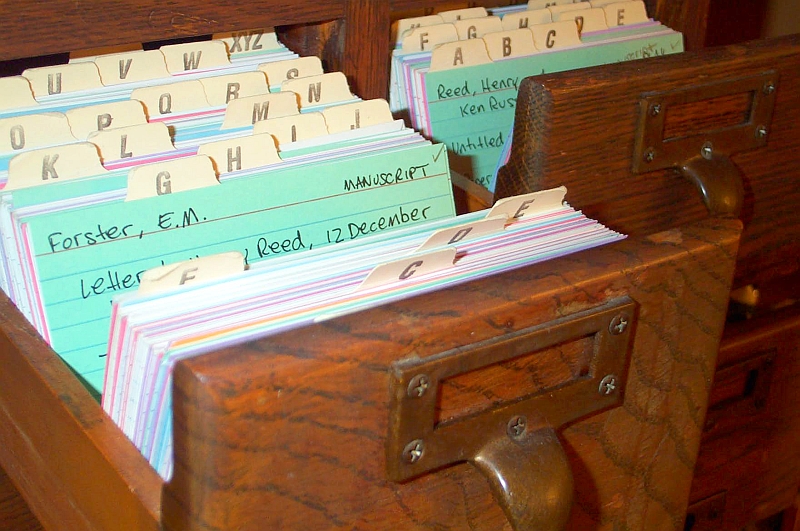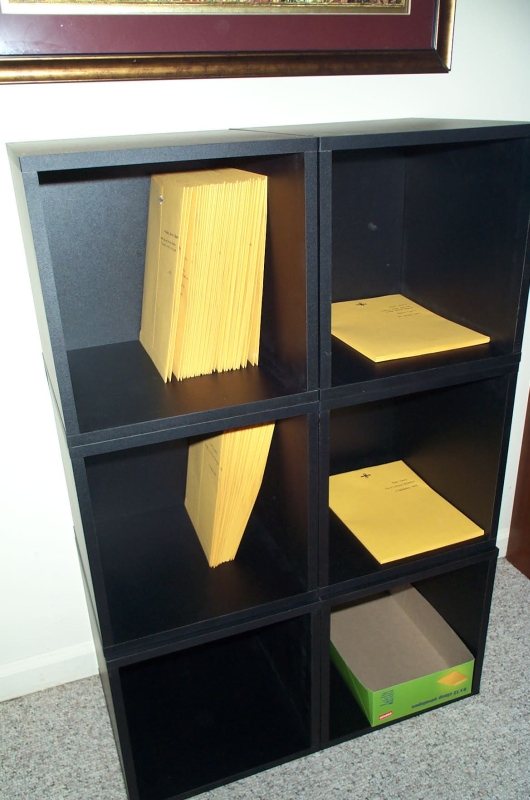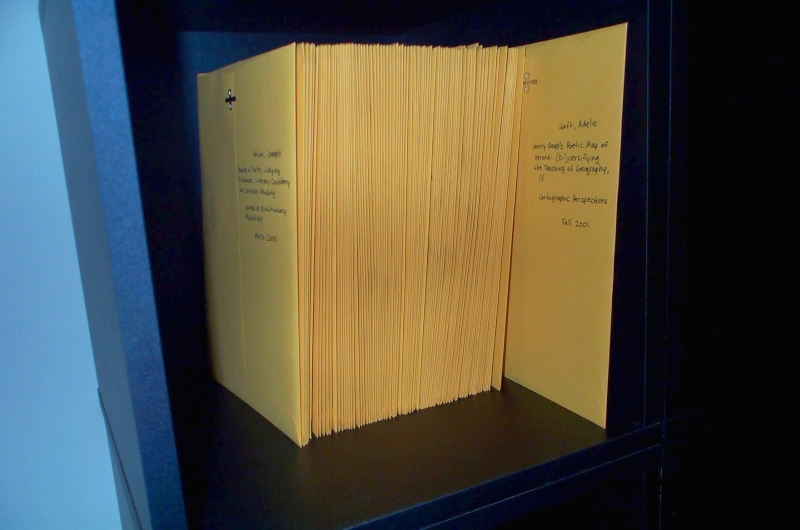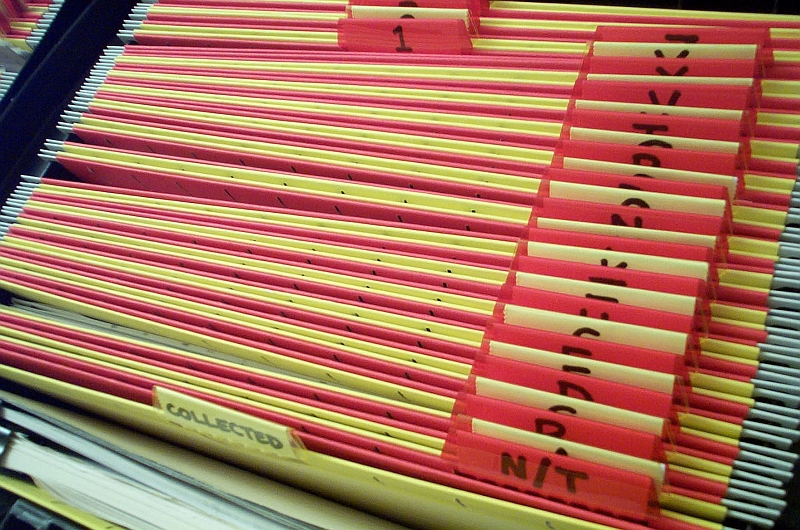This month marks the fifth birthday—anniversary, really—of the Reeding Lessons research blog. The flagship post was in April, 2005, and since then I've managed 350 entries, give or take. That works out to almost six posts per month, if I divided correctly, and is a surprising average, to tell the truth.
Since I started, the bibliography (pictured above) has slowly and steadily grown; I've visited a dozen libraries (including the Library of Congress and the Smithsonian Institution's horticulture library), and uncovered at least half that many reviews of Reed's work; I've been privy to 50-year-old jokes; I've held rare library treasures in my own hands, found over 60 locations that Henry Reed personally visited, and been shown his home in Birmingham; I've seen visits from professors, librarians, poets, students, artists, archivists, and even the likes of Ken Russell; and, most importantly, the site has helped three scholars (that I know of) publish critical works on Reed and his life and work. Which was the whole idea in the first place.
Many items posted here wouldn't have been possible without the occasional prodding from the occasional (or occasionally regular) Reeder, so wish yourselves a happy happy, too!
Thank you.
|
Happy 5th Birthday
Up to SpeedJust a few updates. The bibliography is looking fairly smart now, in its Noguchi-style open-shelf filing, wouldn't you agree? (Compare with my last filing update, Feb. 2006.)
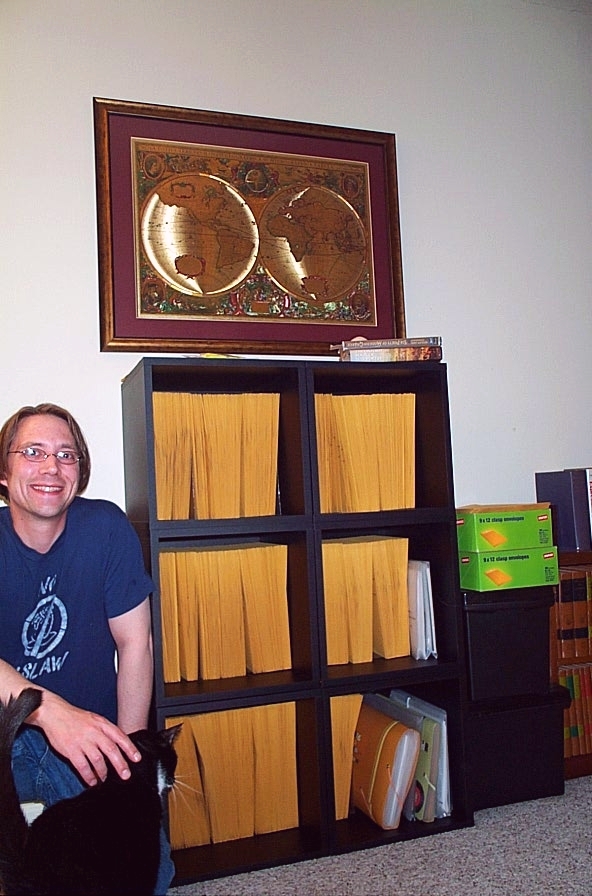 I actually managed to rid myself of one of the file boxes seen piled on the right. Plastic albatrosses. I think I need to buy a couple of more stackable cubes, too, when I have the spare change. They're cheap, but shipping's a killer. Also, I've been steadily finishing bringing the Henry Reed pages up to date, even as I'm considering redesigning and upgrading to version 3.0. The site's getting a little tired, and starting to show its age, don't you think? Most recently, I edited Roger Savage's lengthy chapter from British Radio Drama, "The Radio Plays of Henry Reed," adding page numbers and the all-important appendix, which lists almost all of Reed's radio dramas and their dates of broadcast. Currently, I'm still waiting for Amazon.com to ship me two copies of the new, paperback edition of the Collected Poems. Their estimated date of shipping is not until October 11th!
Possession and the Power of Index CardsI dug through my bookshelves tonight, hunting for my copy of A.S. Byatt's Possession. Ah, here it is: the trade paperback from before the (regretable) film version was released. I've read it twice, and the spine is creased and the corners dulled. When I first read the book, straight through in about two days, I was sure it was a masterpiece (despite the sometimes tedious Victorian verse). On second reading, I was dismayed that it didn't quite captivate me in the same way, and I attributed the discrepancy to my own deprivations the first time around.
It was Possession which originally inspired me to begin organizing the bibliography, first with 3x5 index cards, and then in a database. The obsessed scholars in the novel all keep detailed card indexes, in which they transcribe, outline, and keep track of the minute facts of the lives of their respective authors. Here is a scene between Roland Michell, a research assistant working for the editor of the collected papers of the (fictitious) poet, Randolph Henry Ash, and Beatrice Nest, gatekeeper to the journals of the poet's wife, Ellen Ash: Could I see your card index, Beatrice?" "Oh, I don't know, it's all a bit of a muddle, I have my own system, you know, Roland, for recording things, I think I'd better look myself, I can better understand my own hieroglyphics." She put on her reading glasses, which dangled over her embarrassment on a gilt-beaded chain. Now she could not see Roland at all, a state of affairs she marginally preferred, since she saw all male members of her quondam department as persecutors, and was unaware that Roland's own position there was precarious, that he hardly qualified as a full-blooded departmental male. She began to move things across her desk, a heavy wooden-handled knitting bag, several greying parcels of unopened books. There was a whole barbican of index boxes, thick with dust and scuffed with age, which she ruffled in interminably, talking to herself. "No, that one's chronological, no, that's only the reading habits, no that one's to do with the running of the house. Where's the master-box now? It's not complete for all notebooks you must understand. I've indexed some but not all, there is so much, I've had to divide it chronologically and under headings, here's the Calverley family, that won't do... now this might be it.... "Nothing under La Motte. No, wait a minute. Here. A cross-reference. We need the reading box. It's very theological, the reading box. It appears"—she drew out a dog-eared yellowing card, the ink blurring into its fuzzy surface—"it appears she read The Fairy Melusina, in 1872." She replaced the card in its box, and settled back in her chair, looking across at Roland with the same obfuscating comfortable smile. There you have it: the entirety of my formal training in literary research. I was brought back to Possession this evening by stumbling across Pile of Indexcards, which lovingly blogs, in painstaking detail, a similar system of organization. Indexcard + Tagging + Chronological order = "Indexcarding". Accompanied by a terrific photoset on Flickr. I particularly like the tagging and starring methods.
Noguchi-Stylin'At last, progress. Most of the copies and printouts which had been languishing, unindexed, on the desk and coffee table have been filed in the open-shelf system; they were mostly Third Programme broadcasting schedules from the Times and Radio Times. True Noguchi-style, of course, wouldn't work for a bibliography, as sorting by author, title, and date is necessary to find a specific document. But I'm quite satisfied with the way the system works, and especially with the aesthetics: the orange-yellow of the envelopes against the black shelves.
I dipped into the box containing Reed's essays and poems copied from periodicals, but progressed only as far as titles beginning with "D", before my initial burst of enthusiam wore down. Labeling and stuffing one hundred envelopes at a stretch seems to be about the limit of my endurance. One of the chapters in Altick's The Scholar Adventurers is "The Destructive Elements": describing the losses of many great works of literature, collections of personal letters, and irreplacable manuscripts to "fire, vermin, damp, and neglect." The passages describing the destruction of Sir Robert Cotton's collection of Anglo-Saxon literature is terrifying, and makes me wish I had purchased some sort of fireproof shelving, lest my paltry collection meet the same fate: In 1700 the Cottonian Library was deeded to the nation; and after it was decided that Cotton House was too damp and ruinous for the preservation of the manuscripts the collection was transferred to Ashburnham House, which, besides being dryer and more spacious, was thought to be "much more safe from fire." Two years passed; then, early in the morning of of October 23, 1731, the city of Westminster was aroused by the alarm of fire at Ashburnham House. The first men on the scene saw the flames burning brightly inside the room where Cotton's fourteen book presses stood. Among the crowd which gathered were trustees of the collection, who broke into the burning house, ran to the presses, and feverishly threw hundreds of volumes from the windows. Among these rescuers was Richard Bentley, the Cottonian librarian and the greatest classical scholar of his time, who is reported to have raced from the flaming house "in his dressing gown, a flowing wig on his head, and a huge volume under his arm." He had chosen for salvation by his own hands the precious Alexandrian manuscript of the New Testament. Meanwhile other citizens were laboring at the hand pumps brought by the primitive fire brigade. A few hours later, the portion of Ashburnham House that contained the Cottonian collection lay gutted. Of the 958 manuscript volumes in the library, about a hundred, virtually all irreplacable, were utterly destoyed; and hundreds more which survived were dreadfully charred and water-soaked. Some of these were restored with as much skill as was then possible, but there remained sixty-one bundles of damaged leaves, the sorting and repairing of which was to be delayed until the middle of the next century. Among the volumes which had escaped with minor damage was the unique manuscript of Beowulf, only the edges of which had felt the flames. You'd think moving a precious library into a building named "Ash-burn-ham" would've given someone ironic pause, but. Here are excellent some accounts of the Ashburnham House fire and the miraculous survival of the Beowulf manuscript.
Toward a More Open System of FilingI am anxiously awaiting the start of Part 1 of Masterpiece Theatre's Bleak House, which premieres tonight at 9:00 PM EST on PBS. I'm not a huge fan, having read A Tale of Two Cities in high school and summarily dismissed Dickens as having used too many words to describe too many characters. Indeed, the "Who's Who" page for the series has no fewer than 42 profiles.
Bleak House, however, has the advantage of featuring spontaneous human combustion, and this version has the added draw of Gillian Anderson in the role of Lady Dedlock ("Scully!"). While I watch the case of Jarndyce v Jarndyce unfold, I will be happily stuffing sheets of paper into meticulously labelled manila envelopes. As I reported back in October, I have been seeking a means to upgrade and simplify filing of items from the bibliography. The bulk of my collection are photocopies and printouts: hundreds and hundreds of critical articles from books and journals, newspaper columns from microfilm, .pdf documents. I also have copies of poems, criticism, and book reviews written by Reed himself. My file boxes are full-to-brimming, and reams of unfiled (and uncatalogued) material have been piling up into treacherous, teetering mounds on my desk. Since my desk is a particularly valuable piece of real estate currently located in the kitchen, this is both unsightly and inefficient. Excited by the discovery of the Noguchi filing system, I decided to invest in an open shelf filing system. To this end, I have:
Ow! She's a Bleak — House
Noguchi Filing IIMy own attempts to make my files more accessible have stalled for lack of shelf space (and lucre), but Jonny Goldstein is video blogging his efforts to start an open-shelf, Noguchi filing system. Just wait until I get paid, Jonny Goldstein. My Noguchi technique will crush you! (Please allow six to eight weeks for delivery.)
My New Filing Technique is UnstoppableIt's true: I'm envious of people who own their own filing cabinets. I walk into someone's home or office, my eyes are inexorably drawn to their vertical file, and I find myself saying, "Man. That's a nice filing cabinet. Is that real wood, or laminate?"
Currently, I am storing the documents that make up The Bibliography in two plastic hanging file storage boxes: one for Reed as the author, and the other for secondary sources. This system replaced two large accordian files that I was using up until about a year ago (which I had taken the time to découpage with cutout photographs from magazines). I still use the accordians for toting particular documents back and forth to libraries. With recent acquistions from old newspapers and journals, however, it's painfully obvious that my collection has outgrown the two file boxes, and that is when I began to grow jealous of other people's office furniture. I found myself browsing the furniture aisles in Target and Staples, and even considered upgrading to leather(ette) file boxes. Then I happened across this webpage, on the Noguchi filing system. Noguchi Yukio is a Japanese economist who has written several books and articles about filing and organization (see Edward Vielmetti's blog, Vacuum, for more on Noguchi). In this system, "Chou Seiri Hou" (Ultra Management Technique), documents are stored in individual envelopes, labelled and arranged according to the date they were created (or last accessed). Recently used files stay at the left, or current, side of the shelf (or drawer), while older, unused files drift to the right, and can be safely removed. While the file-by-date system isn't helpful for my purposes, the striking image of all those carefully labelled envelopes got me thinking about storing my files on open shelves, instead of a clunky file cabinet. Wouldn't that be great? A wall of manila, yearning to be thumbed through. Where in town can I go to buy a bunch of modular 15" storage cubes?
|
|||||||||||||||||||||||||||||
|
|
||||||||||||||||||||||||||||||







![Compare and contrast on [Flickr]. Happy Birthday Blog!](http://farm5.static.flickr.com/4019/4539503542_1e41294e95.jpg)
